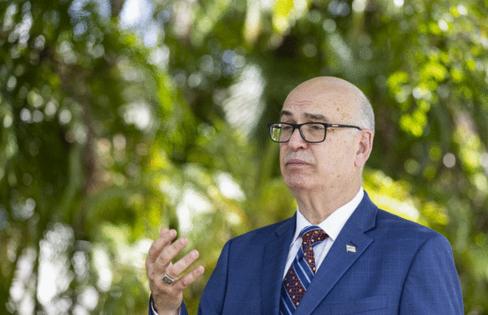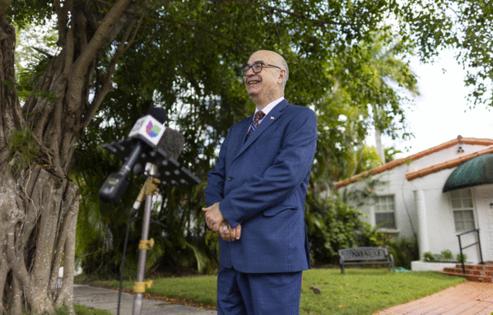Judge rules that Miami election date change was unconstitutional
Published in News & Features
MIAMI — Miami’s decision to postpone its 2025 election to 2026 without voter approval was unlawful and unconstitutional, a judge has ruled.
Miami-Dade Circuit Court Judge Valerie Manno Schurr on Monday issued a written opinion in a lawsuit filed by Miami mayoral candidate Emilio González.
The former city manager sued the city after the Miami City Commission passed an ordinance that postponed the upcoming November 2025 election to November 2026 without voter approval, giving the current elected officials an extra year in office. González had asked the court to find the city’s ordinance “unlawful and invalid.”
In her ruling, Manno Schurr declared that the city cannot change the dates of municipal elections or terms of office without voter approval.
The city had cited three Florida statutes that allow municipalities to move an election date via ordinance, arguing that state laws supersede local rules. But in her ruling, Manno Schurr disagreed.
Manno Schurr pointed to the Miami-Dade County Home Rule Charter, which states that any proposed charter change must be decided by a vote of the electors. Miami’s city charter dictates the rules for elections, including the requirement that elections for mayor and commissioner “shall be held on the first Tuesday after the first Monday in November in odd-numbered years.”
Ultimately, Manno Schurr said, the ordinance the city passed “constitutes an impermissible amendment to the City Charter without a vote of the electorate,” as is required by the Miami-Dade County Charter and the Florida Constitution.
The city filed a notice of appeal shortly after Manno Schurr handed down her ruling. The parties are working on a tight timeline, with both sides telling the judge at a Wednesday hearing that they need a final decision, following appeals, by Aug. 8.
“This is not just a victory for me — it is a triumph for all voters in the City of Miami and across Miami-Dade County who believe in upholding our charter and the rule of law,” González said in a statement Monday.
“We are extremely grateful to the Court for its decision in this critical case, which restores the fundamental right to vote and ensures that citizens can shape their own future,” González’s attorney Alan Lawson said. “... Our client, Emilio González, recognized the far-reaching implications of this case, and we are proud to have worked with him to uphold one of the core guarantees of our Constitution: the right to vote.”
In a statement Monday, the Miami City Attorney’s Office said: “While we respectfully disagree with the trial court’s decision, we are confident in the strength of our case and remain optimistic about the outcome on appeal.”
Commissioner Damian Pardo, who sponsored the ordinance moving the city’s elections from odd to even years, agreed with the city’s statement and declined further comment “until the matter is fully resolved.”
Politicians react
Gov. Ron DeSantis celebrated the judge’s ruling in a post on X.
“City of Miami politicians voted to defy term limits, cancel this year’s scheduled election, and extend their own terms in office — all without voter approval,” DeSantis said. “Today, a judge has put the kibosh on the scheme. Great to see the law and common sense prevail.”
Miami-Dade County Commissioner Eileen Higgins is among the candidates who had already filed to run for Miami mayor in November 2025.
In a statement, Higgins called the ruling “a clear victory for democracy and for every Miami resident who believes elections should be decided by the people — not politicians.”
Higgins added that if voters support moving the city to even-year elections, she’s in favor of reducing the mayor’s term by one year, ending in 2028 instead of 2029, to achieve that goal.
Mayor Francis Suarez, who was a proponent of the ordinance, did not immediately respond to a request for comment on Monday’s ruling.
What each side is arguing
In two separate 3-2 votes, the Miami City Commission approved an ordinance moving the city from odd- to even-year elections. That meant that the scheduled November 2025 election was postponed to 2026 and that the city’s current elected officials would get an extra year in office — even those who are term-limited.
Pardo has argued that the change is a reform measure that will substantially boost voter turnout while cutting election costs.
Critics, however, have called the move a “power grab.” In his lawsuit, González likened it to actions carried out by “regimes in Venezuela, Nicaragua, Bolivia, or Cuba — the very places so many of Miami’s people come from.”
His attorneys have argued that the city violated its own charter, as well as the county charter and the Florida Constitution, by moving the election without voter approval.
The city charter governs the rules for elections, and charter changes generally require voter approval. But the city has argued that passing the ordinance technically didn’t change the charter — rather, it changed the city code. Assistant city attorney Eric Eves acknowledged at a hearing last week that the change puts the city charter and code in conflict with each other.
Manno Schurr called that argument “meritless,” saying it “ignores the effect the Ordinance has on the pertinent provisions of the City Charter.”
The city has relied on three Florida statutes that allow municipalities to move an election date via ordinance, as well as a case in the city of North Miami, which similarly moved its elections to even years via a City Council vote and without voter approval a few years ago.
That case went up to the Third District Court of Appeal, which upheld a lower court’s ruling that the city acted lawfully. The Third DCA ruling did not create binding precedent, however.
_____
©2025 Miami Herald. Visit miamiherald.com. Distributed by Tribune Content Agency, LLC.










Comments